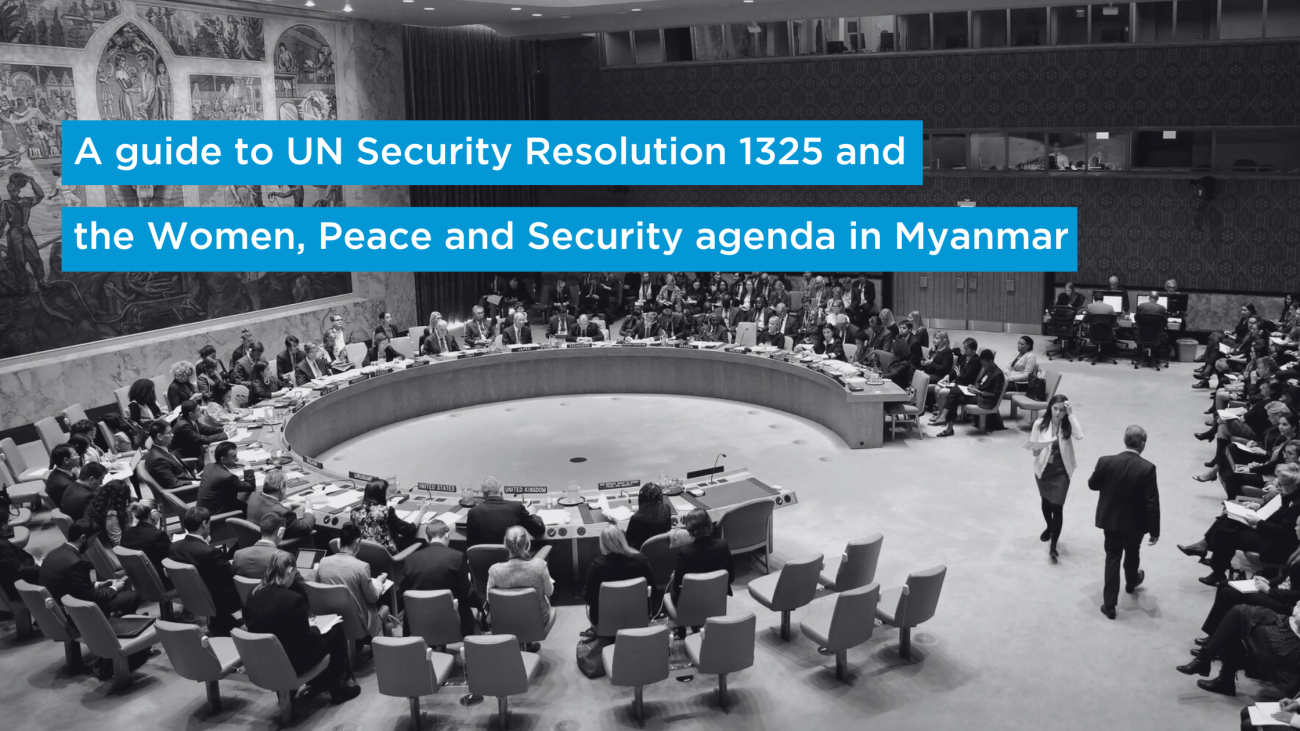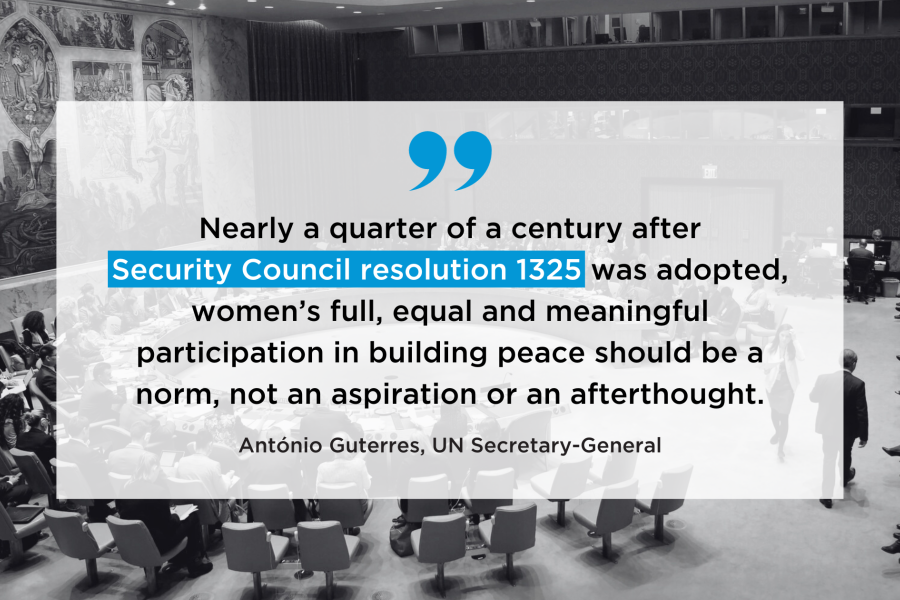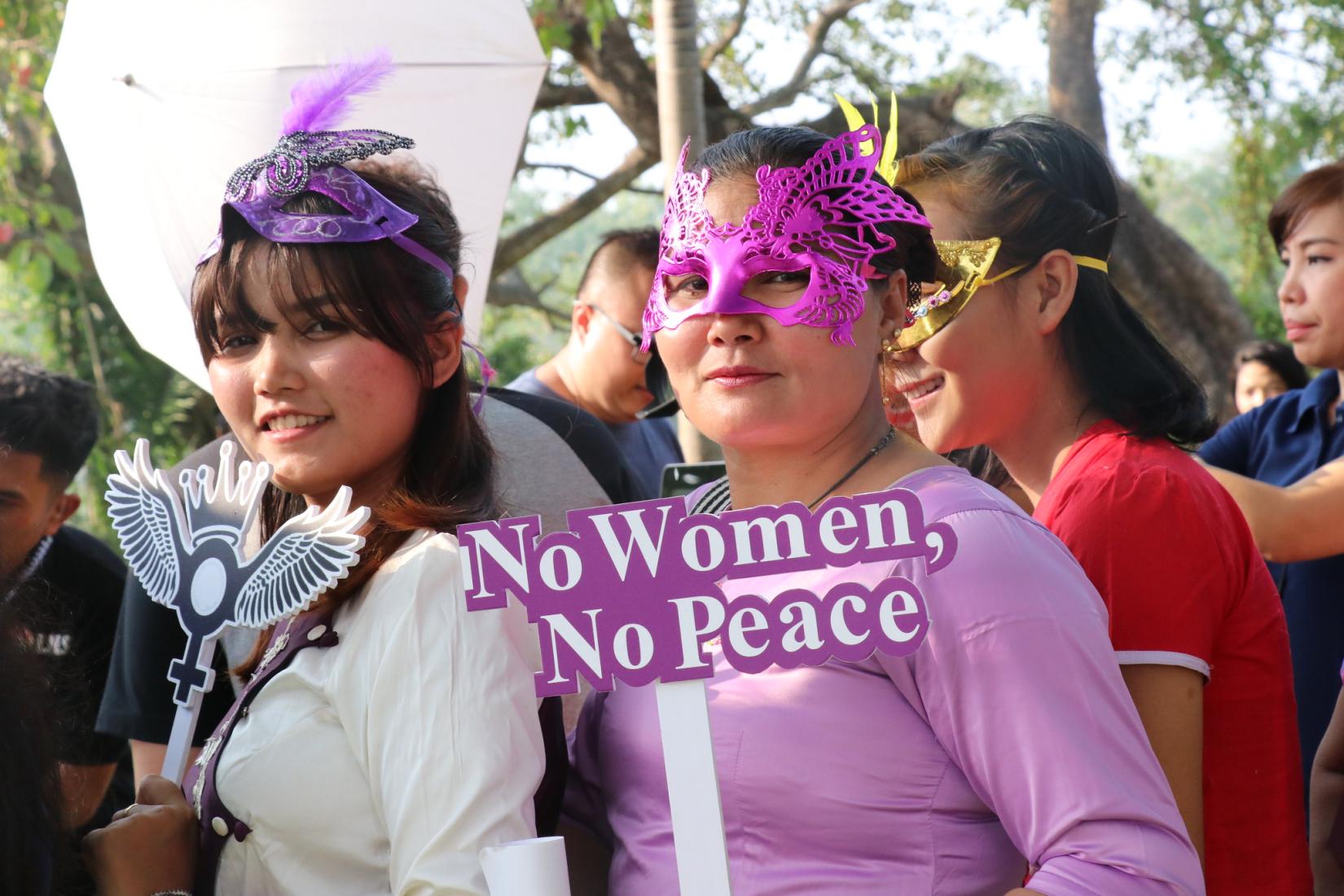Explainer: a guide to UN Security Resolution 1325 and the Women, Peace and Security agenda in Myanmar

On 31 October 2000, the United Nations Security Council adopted Resolution 1325 on Women, Peace and Security (UNSCR 1325).
On 31 October 2023, humanitarian, development, and human rights organizations around the world will commemorate the 23rd anniversary of Security Council Resolution 1325 on Women, Peace and Security. But what is it? And how is it relevant to the multiple crises impacting millions of women and girls in Myanmar?
What is UN Security Council Resolution 1325?
On 31 October 2000, the United Nations Security Council adopted Resolution 1325 on Women, Peace and Security (UNSCR 1325). It was the first resolution to recognize that conflict impacts people differently depending on their gender, and calls out two important issues:
- Women play critical roles in preventing conflict and building peace in communities.
UNSCR 1325 acknowledges that peace and security measures are only sustainable if women are equal partners in peace processes. It calls for women’s full, equal and meaningful participation in every stage of preventing conflict and building peace in their countries.
- Women and girls are disproportionately impacted by violent conflict and war.
UNSCR 1325 calls for special measures to protect women and girls from conflict-related sexual violence, which refers to rape, sexual slavery, forced sex work, forced pregnancy, forced abortion, enforced sterilization, forced marriage, and any other form of sexual violence that is directly or indirectly linked to a conflict.

What is the Women, Peace and Security agenda?
Even before the adoption of UNSCR 1325, the principles of the Women, Peace and Security (WPS) agenda were championed by a global coalition of women’s rights organizations.
Today, the WPS agenda is based on ten UN Security Council resolutions – beginning with UNSCR 1325 – and calls for action across four pillars:
- Participation: Calls for the full, equal, and meaningful participation of women and girls in decision-making processes at national, local, regional, and international levels related to the prevention, management, and transformation of conflicts.
- Protection: Calls for the protection of women and girls’ safety and rights.
- Prevention: Calls for the prevention of conflict and all forms of structural and physical violence against women and girls, including prosecuting those responsible for violations of international law; strengthening women’s rights under national law; and supporting local women’s peace initiatives and conflict resolution processes.
- Relief and recovery: Calls for women and girls’ specific relief needs to be met and women’s capacities to act as agents in relief and recovery reinforced in conflict, post-conflict, and post-disaster situations.
Why is the WPS agenda important to women and girls in Myanmar?
The multiple crises in Myanmar have increased the pre-existing inequalities, marginalization and vulnerabilities of women and girls. They often bear the brunt of additional and more resource-heavy and time-consuming care work, increased food insecurity, and the risk of gender-based violence (GBV).
In 2022, a joint study by UN Women and UNDP in Myanmar, found nearly one in three women no longer feel safe within their own neighborhood or village during daylight hours. This stands in stark contrast to 2019 when only 3.5 percent of women reported feeling unsafe during the day. One in five women reported seeing violent behaviour against a woman or girl in their neighborhood since the COVID-19 pandemic began.
The UN Secretary-General’s Report on Conflict-Related Sexual Violence and recent reports from the Independent Investigative Mechanism for Myanmar and the UN Office of the High Commissioner for Human Rights point to increased conflict-related sexual violence across the country since February 2021. And local women’s rights organizations report that domestic and intimate partner violence has increased in the wake of the multiple crises affecting Myanmar.

How is the WPS agenda implemented in Myanmar and Southeast Asia?
While no WPS NAP has been developed in Myanmar, a 10-year National Strategic Plan for the Advancement of Women (NSPAW) was adopted in 2013 and included a ‘women and emergencies’ category. Additionally, action plans at state level were developed in various states, including Kayin, Mon and Kayah, advancing the WPS agenda by state governments and multiple stakeholders including women civil society organizations.
At the regional level, ASEAN initiated a regional plan of action on WPS, which aims to help coordinate and strengthen the WPS policies of ASEAN member states. Indonesia and the Philippines have established explicit WPS National Action Plans (NAPs), and Vietnam is in the process of developing one. Some member states, for example Thailand, have policy frameworks that align with the principles of WPS NAPs.
How does UN Women implement the WPS agenda in Myanmar?
UN Women has been in Myanmar since 2013, working with an extensive network of women-led and women’s rights organizations to support vulnerable women and girls.
UN Women is the global custodian of the WPS agenda. It underpins all our work in Myanmar, which includes:
- Creating an enabling environment for the WPS agenda in Myanmar by providing gender data and expertise critical for informing evidence-based responses across the humanitarian, development, and peacebuilding nexus.
- Supporting women to lead and participate in decision-making by building the capacity of women leaders and women-lead civil society organizations through institutional and technical capacity building. Topics include organizational governance and leadership, mediation and gender.
- Improving the protection of vulnerable women and girls and increasing respect for their human rights, including through integrated GBV prevention and response; cash-based interventions; and training community members to promote women’s rights and raise awareness about preventing gender-based violence.
- Increasing women’s leadership and participation in humanitarian action, including by providing funding to local women-led civil society organizations (WCSOs), so they can provide humanitarian support across the country and help strengthen other WCSOs and women’s rights organizations through capacity building and grants.
What is needed to progress the WPS agenda in Myanmar and globally?
Globally, aid to peace and security continues to underprioritize gender equality, with women-led organizations’ contributions being undervalued and under-resourced. According to 2021 OECD data, only 0.68 per cent of Official Development Assistance (ODA) in Myanmar goes to women’s rights organizations.
The 2023 Report of the Secretary-General on Women and Peace and Security reveals that in 2021, only 6 per cent of bi-lateral aid to conflict-affected contexts, was dedicated to gender equality as a principal objective, despite calls for moving towards and exceeding targets such as the United Nations goal of 15 per cent.
As we mark 23 years since the adoption of UNSCR 1325, UN Women Myanmar joins the Security-General’s call for urgent global action to progress the WPS agenda, including:
- Allocate a minimum of 15 per cent of ODA to gender equality, including a minimum of 1 per cent to women’s organizations, especially grassroots groups mobilizing for peace.
- Increase use of accountability to strengthen the protection of women and girls in crisis settings.
- Support women-led civil society organizations working to promote peace and development in their communities.
More information:
- Watch this UN Women video overview of UNSCR 1325 in the Asia Pacific Region.
- Read the UN Women Myanmar Peace Facilitator’s Handbook for tools to help women leaders. both meaningfully participate in local peace processes and train other women peacebuilders.
- Read the UN Women Myanmar Country Profile to find out more about our work in Myanmar.
- Read UN Women’s expert take on what the Secretary-General’s New Agenda for Peace means for women.




